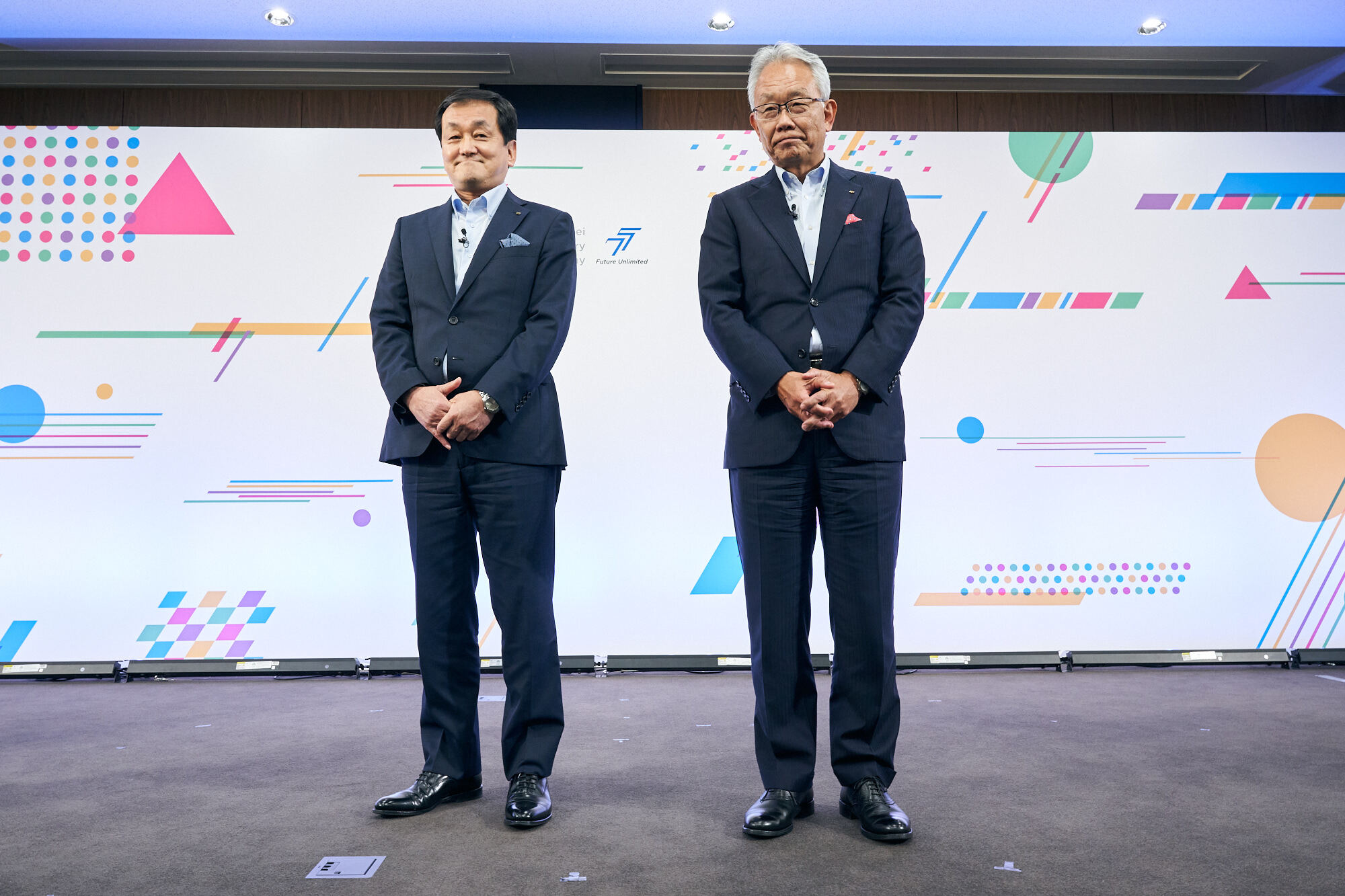未来
「共創。限界なき未来に挑む」をテーマに100年企業への扉をひらく
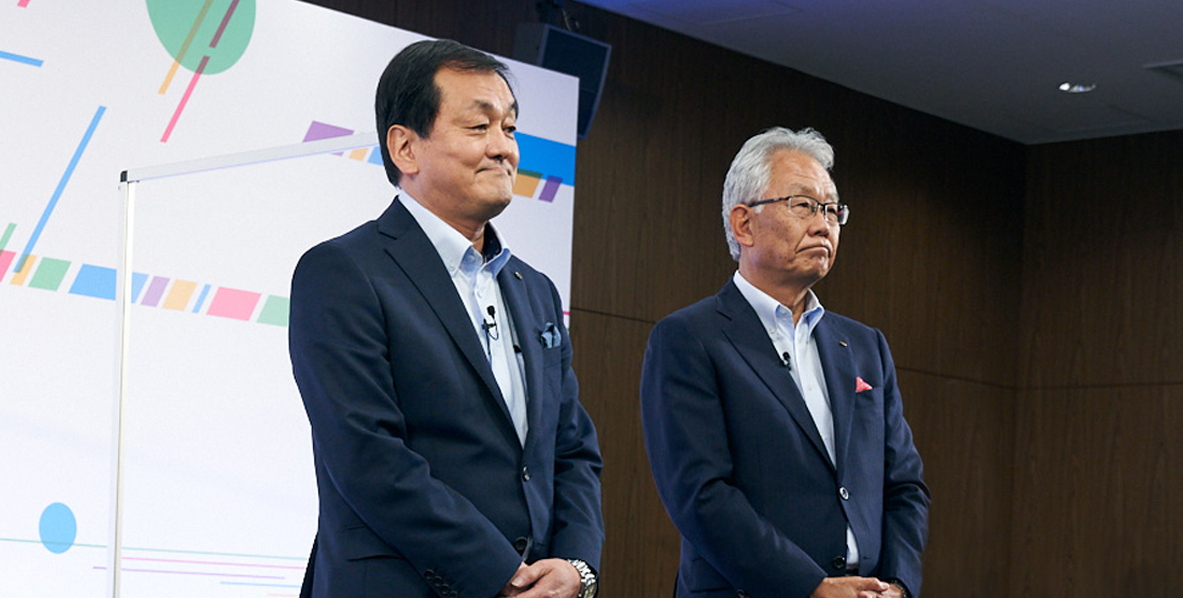
日本工営創立75周年記念式典で発表された、2030年に向けた長期経営戦略。有元龍一会長と新屋浩明社長に、その具体的な内容について詳しく伺いました。
[第一部] 有元会長インタビュー
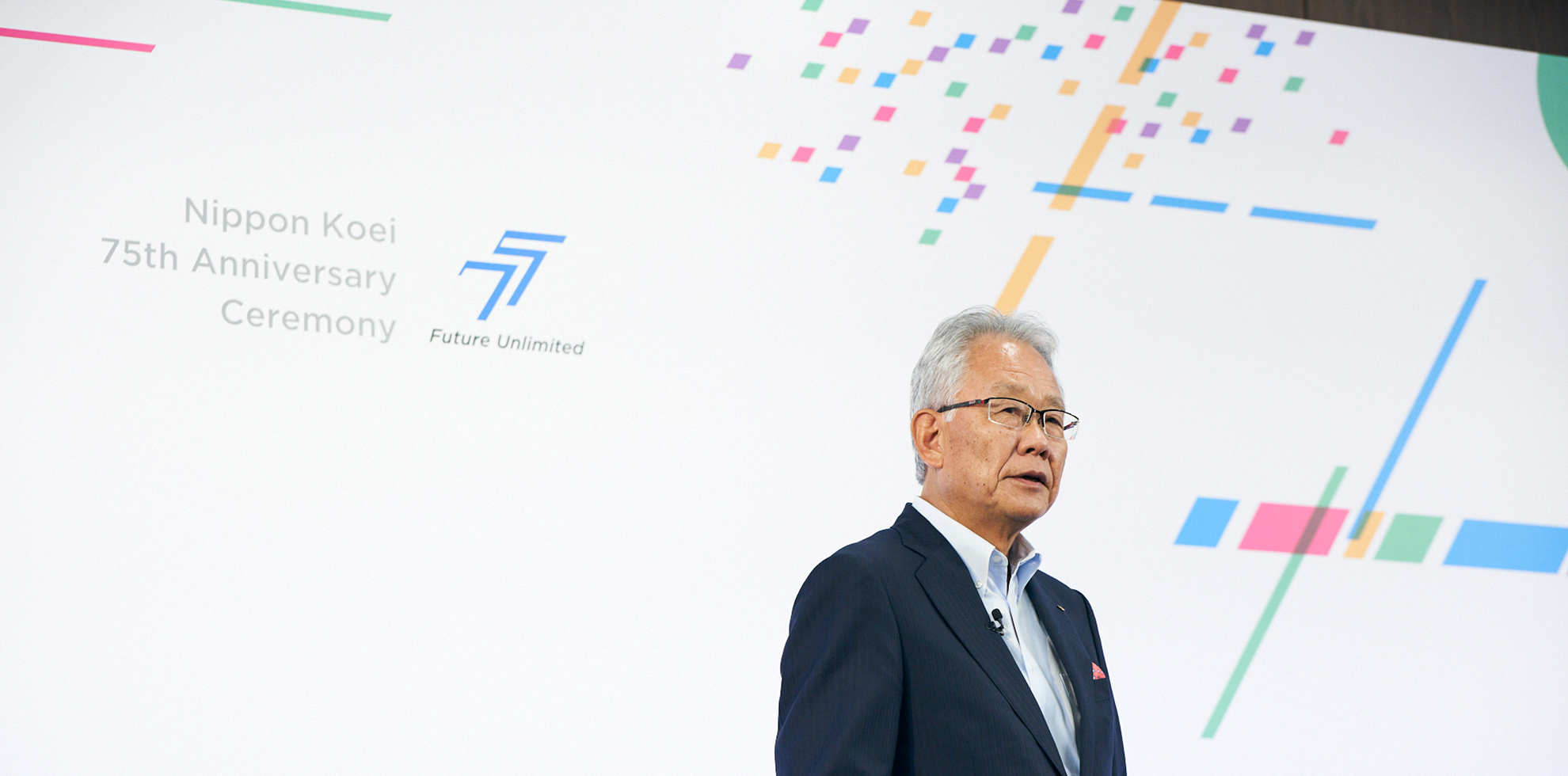
―今回の長期経営戦略のテーマ「共創。限界なき未来に挑む」に込めた思いについて教えてください
有元会長:現在、全世界共通の目標となっている「持続可能な世界」を実現するためには、今後も様々な社会課題が出てくることが想定されます。これらの課題に果敢に挑戦し続けるためには、社員同士、グループ会社間はもちろん、顧客・パートナー企業と協力し、さらには地域社会や社会全体を巻き込んで、「共に創る」意識で取り組むことがより重要だと考えています。
―10年後のNKグループはどうあるべきと考えていますか。
有元会長:現代社会には「急速な都市化の進行」「気候変動と資源不足」「人口構造の変化」「世界の経済力のシフト」「テクノロジーの進歩」という5つのメガトレンドがあります。
これらを踏まえて、新興国における「急速な都市化の進行」に対しては、鉄道インフラの整備や都市空間づくりに注力します。2つ目の「気候変動と資源不足」には、当社が創業以来関わっている水力発電開発やエネルギーマネジメントビジネスを通じて対応します。3つ目の「人口構造の変化」には各国の市場をよく知るグループ会社や人財の強化を図ります。4つ目の「世界の経済力のシフト」に対しては、既存の枠組みにとらわれない新たなビジネスを創出していきます。そして5つ目の「テクノロジーの進歩」により、将来は異業種連携がさらに活発になり、NKグループもコンサルタントの枠を超えたエンジニア集団を目指していきます。
―2030年の具体的な数値目標は?
有元会長:NKグループ連結で売上高2,500億円、営業利益率10%、ROE15%を目指します。
そのために、3つの「共創」施策を実践します。
―3つの「共創」施策の内容を教えてください。
有元会長:1つ目は、事業区分の再編です。コンサルティング事業・都市空間事業・エネルギー事業の大きく3つに分けることで、各事業を強化するとともにワンストップで「共創」ができる体制を構築します。
2つ目は、自律と連携の促進です。純粋持株会社を中心に企業群を作り、事業軸と地域軸によるマトリクス経営を行います。同時に事業マネジメント分野へも本格的に進出し、Think Globally, Act Locallyを実践します。
3つ目は、NKGブランド、NKGクオリティの体現です。そのために人財投資、技術開発、事業投資を推進します。まず人財投資においては世界トップクラスの人財育成を図るNKG Global Academyを設立し、技術開発においてはDX等の最先端技術による新事業開拓と既存事業の高付加価値化を目指します。さらに異業種も含め「共に創る」仲間を増やすために事業投資も行っていきます。
―サステナビリティへの取り組み、社員の働き方等については、いかがですか。
有元会長:NKグループが携わるすべてのプロジェクトはSDGsに貢献していますが、今後はますます、サステナビリティを事業コンセプトの中心に置くことが求められます。
経営においても、従業員の健康や幸せを常に考え、多様性を尊重するWellbeing経営を推進していきます。
社員のみなさんにも、当社のコンプライアンスを改めて認識し、高い倫理感を持って行動することを期待しています。
―有元会長が考える、NKグループの強みは何でしょうか?
有元会長:NKグループは創業者久保田豊の時代から 数多くの社会課題解決に取り組んできました。経営理念の「誠意をもってことにあたり、技術を軸に社会に貢献する。」は久保田豊の言葉を集約したものですが、私たちが常に立ち戻るべき原点です。
NKグループには世界中に約6,000名のスペシャリストが存在します。みなさんが持つ技術に代表される「知」と、その集合体である「総合力」は私たちの大きな強みです。
社員みなさんがNKグループの源泉です。2030年に向けてNKグループは世界が価値を認める、世界になくてはならない会社を目指します。みなさんの力を思う存分発揮してください。
[第二部] 有元会長・新屋社長トークセッション
7月に新社長に就任した新屋浩明社長をお迎えして、有元会長と今後の展望についてお話しいただきます。

―改めて、長期経営戦略のテーマに「共創」というキーワードを出した理由についてお聞かせください。
有元会長:世の中が変わればお客様が変わり、仕事の仕方も変化します。複雑化する社会課題、加速するイノベーションに対応するためには、社内外の力を結集し、地域の人々と一緒に取り組むことが必要です。そこから出てきたコンセプトが共創、「共に創る」でした。
新屋社長:私は2013年に仙台支店に赴任し、東日本大震災の復興事業に従事しました。そこで、岩手県大槌町や福島県相馬市の震災復興CM(Construction Management)事業に取り組み、発注者の方々や地域住民の方々をはじめとするすべての関係者と寝食を共にして最適解を模索しました。これはまさに「共創」を体現した事業だと考えています。仲間や地域住民のみなさんと一緒に「共に創って」いく。これこそが、日本工営グループの成長の源泉だと考えています。
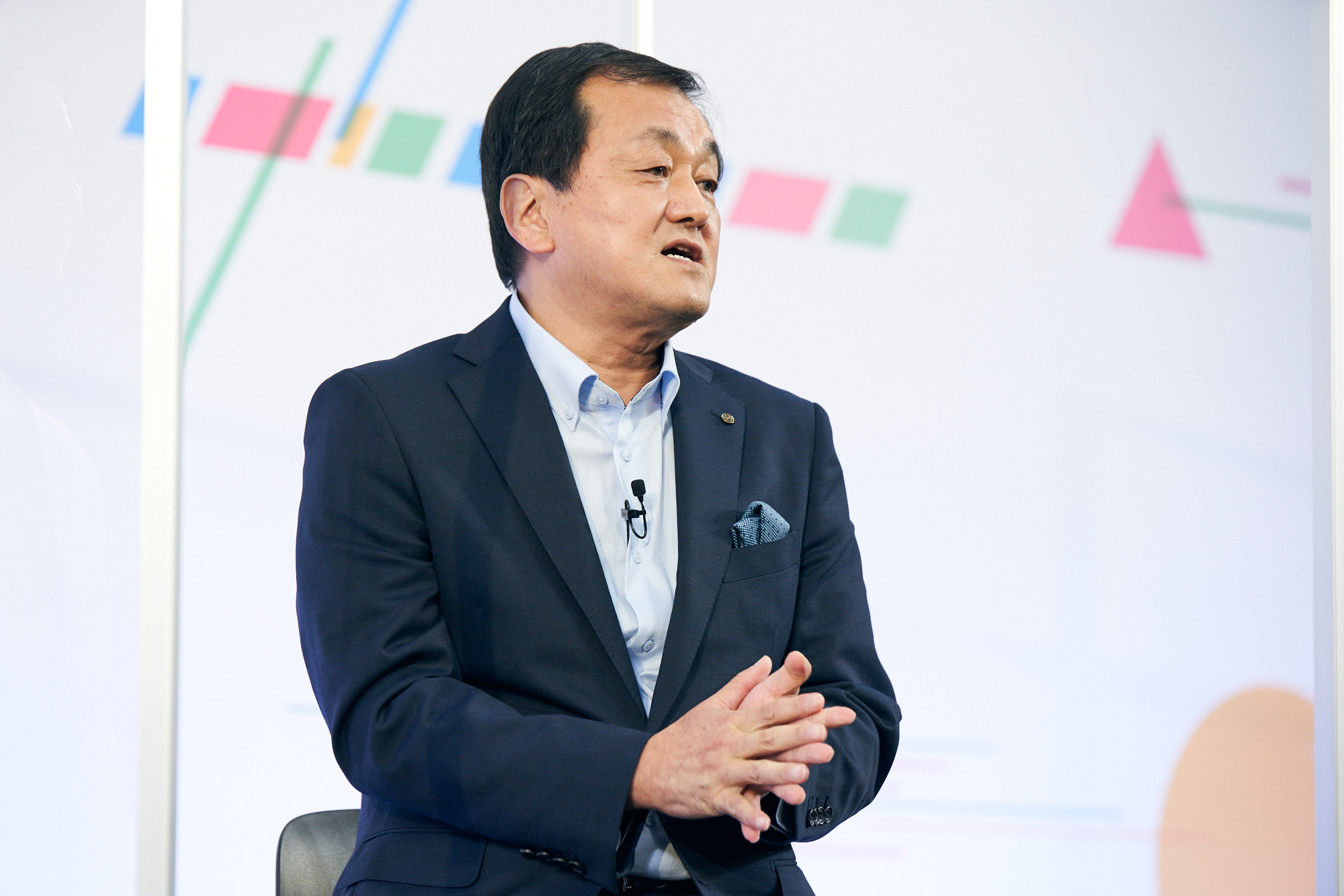
―変化する社会に対して、社員のみなさんには、どのような意識で仕事に取り組んでほしいと考えますか?
新屋社長: このような変化の激しい時代にあっては、自分たちの強みと弱みを認識し、強みを活かして弱みを補う意識をもつことが重要だと考えます。災害の多い日本で培われた防災・減災技術は当社の強みの筆頭であり、そしてこれらの強みのある技術を、NKグループのネットワークでグローバルに展開できることが最大の強みです。一方で、過去には品質やコンプライアンスに対して脇の甘さから会社を危機にさらしたこともあります。このことは「弱み」として今後も戒めとすべきでしょう。
経営理念の「誠意をもってことにあたり、技術を軸に社会に貢献する。」の「誠意」には、「真面目に物事に向かう心」という意味があり、その心は “積極的な意識”のことです。みなさんには、積極的な意識である「目的意識」「危機意識」「当事者意識」の3つを常に持ち続けてほしいです。
―これからどのような会社の体制を作っていこうとお考えでしょうか?
有元会長:私は2016年、BDPがグループに参加することを契機に、「自律と連携」をテーマにグループ経営を進めてきました。それぞれのグループ会社が自律し、成長する。その集合体がNKグループです。一方、連携とは、ひとつの組織ではできないことを、総合力によって達成することです。
新たな長期経営戦略では純粋持株会社をコアとしたマトリクス経営を推進しますが、世界を俯瞰して、複雑化する社会課題を分析し、時代を先取りした技術・人財・事業への投資を進める一方で、地域のニーズに応える各事業会社の強化も重要です。こうした企業の形と事業運営の仕組みを進化させていくことが、真のグローバル企業への道だと考えています。
新屋社長: 「自律と連携」に「共創」という視点を加えた「NKG強靭化」施策を展開していきます。第1部で有元会長が説明された“3つの共創”と同義ですが、ここでは“糸”を例にお話します。
NKG強靭化策の1つ目は、従来の5つの事業を3つの事業ドメインに再編し、縦糸である「事業の強靭化」を図ることです。そして、横糸である営業体制・リスクマネジメント体制・ガバナンス体制などの強靭化を図るため、事業と地域のマトリクス経営の拡大を強靭化策の2つ目としました。これらは長期経営戦略の助走として2020年7月より、組織変更など取り組みを既にスタートしています。
強靭化策3つ目は、「NKGブランドとNKGクオリティの確立」です。顧客満足度の高い成果品を提供するNKGクオリティは「縦糸の質」、これまで培ってきた世界各国との信頼関係であるNKGブランドは「横糸の質」そのものです。さらに「縦・横糸の質」は「人財」そのものですので、「人財の強靭化」は最重要課題と認識しています。
―「NKGブランドとNKGクオリティの確立」について、もう少しお聞かせください。
有元会長:新たに創設するNKG Global Academyが人財強靭化策の代表です。「知恵」「知見」「技術」「優れた人間性」を兼ね備えた世界トップクラスの人財を養成し、NKグループブランド、NKクオリティの確立を目指します。このNKG Global Academyでの養成の対象は、NKグループ社員だけでなく、外部のパートナーも含んでいます。
また、DX等による新事業開拓と既存事業の高付加価値化も進めていきます。
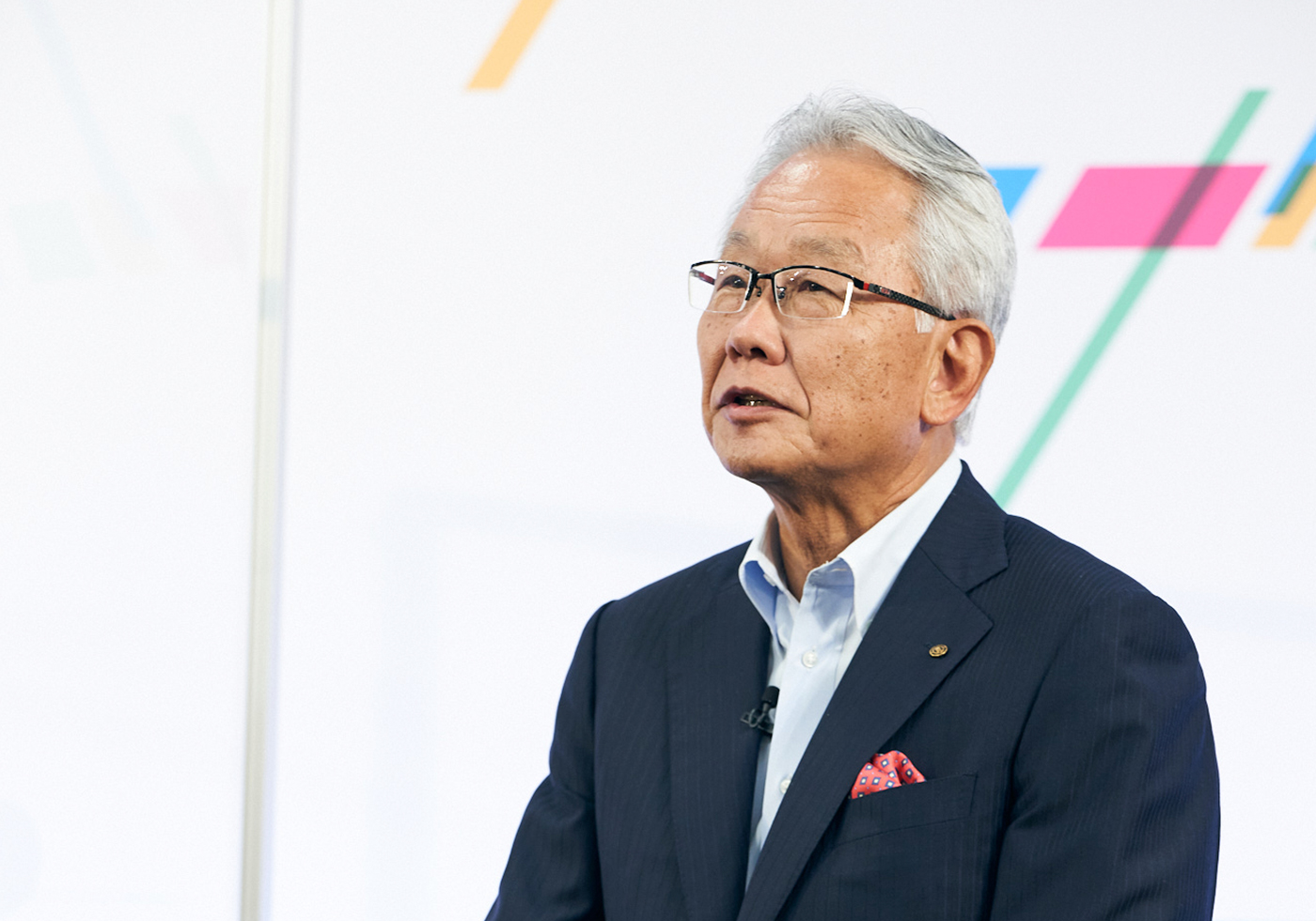
―最後に、長期経営戦略の目標年である2030年、日本工営グループの姿はどうなっているでしょうか。
有元会長:この長期経営戦略は100年企業に向けた序章に過ぎません。2030年以降の世界が直面する課題解決に向けて今から準備しなくてはなりませんが、それができる会社が日本工営です。互いをリスペクトし合う組織文化を醸成し、個人の成長が企業の成長に繋がり、企業の成長がチームメンバーの幸福に繋がるサイクルを実現したいと考えています。
新屋社長:有元会長がおっしゃったことを実現して広く社会に頼られる会社となり、日本では圧倒的№1、世界でもトップクラスのコンサルタント&エンジニアリング企業集団となることを、社員のみなさんと目指していきたいと思います。一致団結して、強靭なNKGブランド、NKGクオリティを共に創っていきましょう。
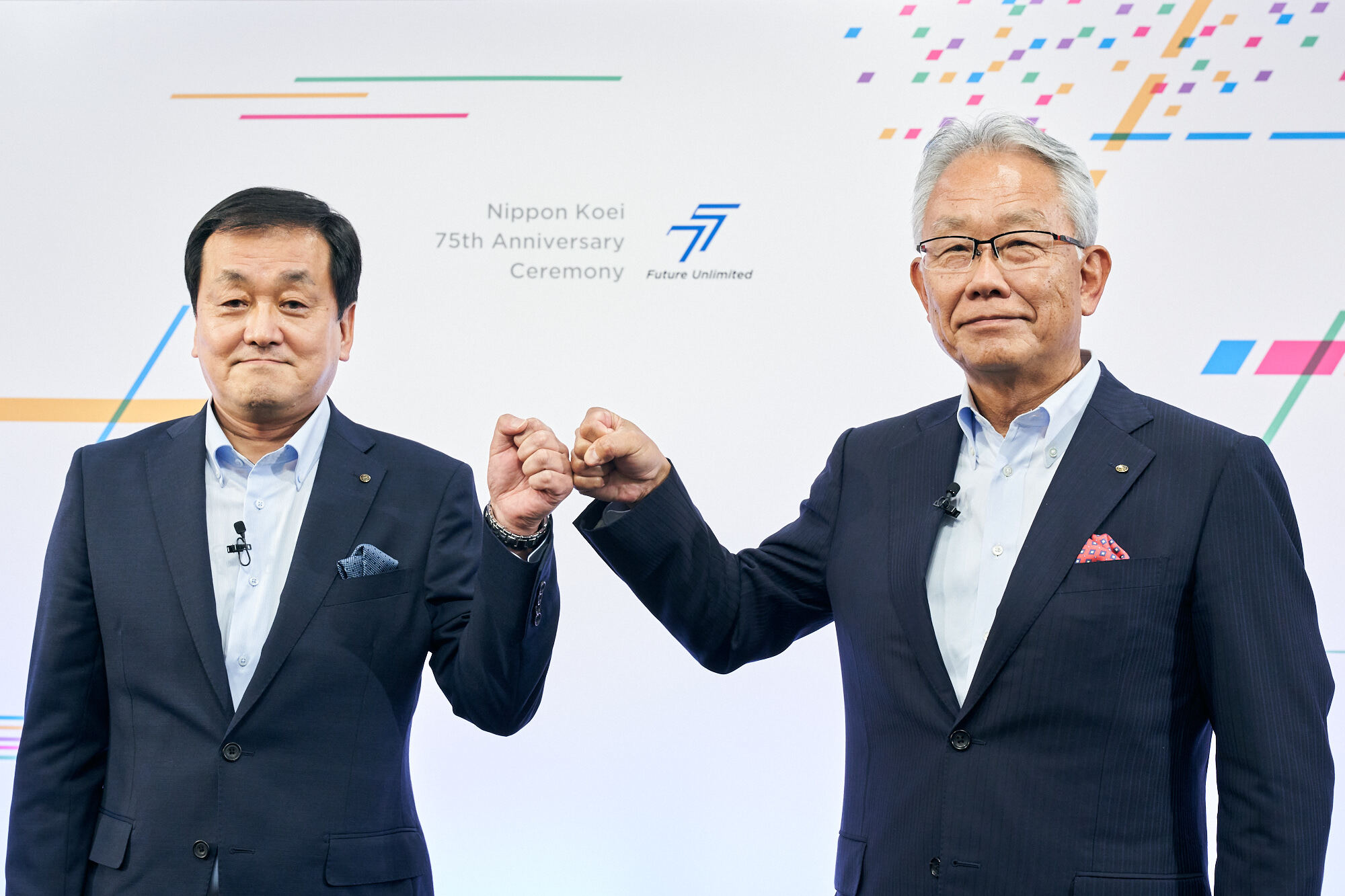
Opening the Door to a 100-Year Company under the Theme of “Working Together toward a Future Without Boundaries”
The long-term management strategy targeting 2030 was announced at Nippon Koei’s 75th anniversary ceremony. We asked Chairman Ryuichi Arimoto and President Hiroaki Shinya to elaborate on the specifics of the strategy.
Part 1: Interview with Chairman Arimoto
Please tell us about the thinking behind the theme of this long-term management strategy, “Working Together toward a Future Without Boundaries.”
Chairman Arimoto: To achieve the sustainable society that is the common goal of the whole world, it is assumed that various social challenges will continue to arise. In order to continue boldly taking on these challenges, we believe it will be even more important to approach them with an attitude of “Working Together,” not only among our staff and Group companies, but also in cooperation with our customers and partner companies, as well as involving local communities and society as a whole.
What kind of company do you think the NK Group should be in ten years’ time?
Chairman Arimoto: There are five megatrends in contemporary society: rapid urbanization, climate change and resource scarcity, demographic change, shifts in global economic power, and advances in technology.
Concerning the first of these, the rapid urbanization, occurring in emerging countries, we will focus on improving railroad infrastructure and developing urban spaces. Regarding the second, climate change and resource scarcity, we will respond through hydroelectric power development and our energy management business, which we have been engaged in since the company was founded. In response to the third, demographic change, we will strengthen our Group companies and human resources who are familiar with the markets in each country. As for the fourth, shifts in global economic power, we will develop new businesses that are not bound by existing frameworks. The fifth megatrend, advances in technology, is expected to further vitalize cross-industrial cooperation, and the NK Group will aim to become a group of engineers that goes beyond the boundaries of consultants.
What are your specific numerical targets for 2030?
Chairman Arimoto: The NK Group is aiming for total consolidated sales of 250 billion yen, an operating profit margin of 10 percent, and a 15 percent return on equity (ROE). To achieve these targets, we will implement three “Working Together” policies.
Please outline the contents of these three “Working Together” policies.
Chairman Arimoto: The first policy is reorganizing business segments. By dividing our business into three domains—Consulting Business, Urban & Spatial Development Business, and Energy Business—we can strengthen each business and create a system for “Working Together” on a one-stop basis.
The second policy is promoting autonomy and collaboration. By creating a group of companies centering around the Holding Company, we will conduct matrix management across businesses and regions. At the same time, we will make a full-scale entry into the business management field, putting into practice our approach of “Think Globally, Act Locally.”
The third policy is manifesting the NKG brand and NKG quality. To achieve that, we will promote human resources investment, technology development, and business investment. Regarding human resources investment, we will establish the “NKG Global Academy” to develop world-class human resources. In terms of technology development, we will aim to develop new businesses and add high value to our existing businesses through DX and other leading-edge technologies. In addition, we will conduct business investment, including in other industries, to increase the partners with whom we are working together.
Could you tell us something about your sustainability initiatives and the work styles of your staff?
Chairman Arimoto: All the projects the NK Group is engaged in contribute to the SDGs, but from now we will further be required to position sustainability at the center of our business concept. We will also always consider the health and happiness of our staff and will promote wellbeing management that respects diversity.
We also expect all our staff to renew their awareness of the company’s compliance and act with a high sense of ethics.
What do you think are the NK Group’s strengths?
Chairman Arimoto: Since the times of the NK Group’s founder, Yutaka Kubota, we have strived to resolve many social issues. Our management philosophy, “Act with integrity and contribute to society through technology and engineering,” a summary of the words of Yutaka Kubota, is a starting point that we should always return to.
The NK Group has about 6,000 specialists all over the world. I think the wisdom represented by their technical skills and the integrated capabilities that are the aggregate of those skills are our great strengths.
Our staff are the source of the NK Group’s strengths. Toward 2030, the NK Group will aim to become a company whose value is recognized by the world and is indispensable to the world. I want all of our staff to demonstrate their abilities to the full.
Part 2: Talk Session with Chairman Arimoto and President Shinya
Mr. Hiroaki Shinya, who became the new President in July, joined us to talk with Chairman Arimoto about the future outlook of the NK Group.
Once again, could you tell us why you used the key words “Working Together” as the theme of the long-term management strategy?
Chairman Arimoto: When the world changes, our customers change and the way we work changes. To respond to increasingly complicated social challenges and accelerating innovation, we must bring together capabilities inside and outside the company and work together with people in local communities. The concept that arose from these considerations was “Working Together.”
President Shinya: When I took up a new post at the Sendai Branch Office in 2013, we took part in reconstruction projects following the Great East Japan Earthquake. When we conducted construction management for earthquake damage reconstruction in Otsuchi Town, Iwate Prefecture, and Soma City, Fukushima Prefecture, we ate and slept with the people involved, including those who ordered the work and the local residents, as we searched for the best solutions. This was the very embodiment of our concept of “Working Together.” I think this working together with partners and local residents is the source of the Nippon Koei Group’s growth.
In this changing society, with what kind of awareness do you want your staff to tackle their work?
President Shinya: In rapidly changing times such as these, I think it is important for us to realize our strengths and weaknesses and know how to leverage those strengths and compensate for those weaknesses. The disaster prevention and mitigation technologies we have cultivated in Japan, where natural disasters are frequent, are among our greatest strengths. Our ability to deploy these technologies globally making use of the NK Group’s networks is our greatest strength. On the other hand, in the past, there have been times when carelessness concerning quality and compliance have put the company in jeopardy. I think this is a weakness we should continue to guard against.
The “sincerity” in our management philosophy, “Tackle your problems with sincerity and the road ahead shall be clear,” means an attitude of approaching things seriously, in other words, a “positive attitude.” I would like all of our staff to always maintain three positive attitudes: a sense of purpose, a sense of crisis, and a sense of ownership.
From now on, what kind of corporate structure are you aiming to build?
Chairman Arimoto: Since BDP joined the Group in 2016, we have promoted group management based on the theme of autonomy and collaboration. Each of our Group companies is autonomous and grows by itself, and the aggregate of these companies is the NK Group. On the other hand, collaboration is doing through our combined strength what cannot be done by one organization alone.
In the new long-term management strategy, we will conduct matrix management centering around the Holding Company. While analyzing the increasingly complex social challenges from a global perspective and investing in pioneering technologies, human resources, and businesses, it will also be important to strengthen each operating company so that they can meet local needs. I believe that evolving this corporate form and business operation systems is the path to becoming a truly global company.
President Shinya: We are pursuing a policy of promoting “NKG resilience” which adds the perspective of “Working Together” to “Autonomy and Collaboration.” This has the same meaning as the three “Working Together” policies Chairman Arimoto outlined in Part 1. I would like to explain this using “threads” as a metaphor.
In our first resilience policy, we aim to promote the resilience of business by reorganizing our existing five business segments into three business domains, which are the warp, or vertical, threads. Then, to enhance the resilience of our sales, risk management and governance systems, which are the woof, or horizontal, threads, we made the expansion of matrix management across businesses and regions our second resilience policy. We have already started these initiatives including organizational changes since July 2020 as a run-up to the long-term management strategy.
Our third resilience policy is establishing the NKG brand and NKG quality. The NKG quality which provides products that ensure high customer satisfaction is the warp, or vertical, quality, while the NKG brand through which we have cultivated relationships of trust with countries all over the world is the woof, or horizontal, quality. Furthermore, since this warp and woof quality is the essence of human resources, we view promoting the resilience of human resources as our most important challenge.
Please tell us a little more about your policy of “establishing the NKG brand and NKG quality.”
Chairman Arimoto: The newly established NKG Global Academy will be the cornerstone of our policy to promote the resilience of human resources. We will develop world-class human resources who possess wisdom, knowledge, technical capabilities, and excellent human qualities, and aim to establish the NKG brand and NKG quality. The students at the NKG Global Academy will not only be staff of the NK Group, but will also include our external partners. We will also develop new businesses and add value to our existing businesses through DX and other leading-edge technologies.
Finally, in 2030, the target year of the long-term management strategy, what will the NK Group be like?
Chairman Arimoto: The long-term management strategy is just the beginning of our journey toward becoming a 100-year company. It is necessary to start preparing now in order to resolve the challenges the world will face from 2030 onwards, and Nippon Koei is the kind of company that can do this. We want to foster an organizational culture of mutual respect and realize a cycle whereby personal growth leads to corporate growth and corporate growth leads to the happiness of all team members.
President Shinya: By achieving the aims President Arimoto has outlined and becoming a company that is widely trusted by society, we will aim together with all our staff to become a group of consulting and engineering companies that is overwhelmingly No. 1 in Japan and top class in the world. Let’s work together to create a resilient NKG brand and NKG quality.
